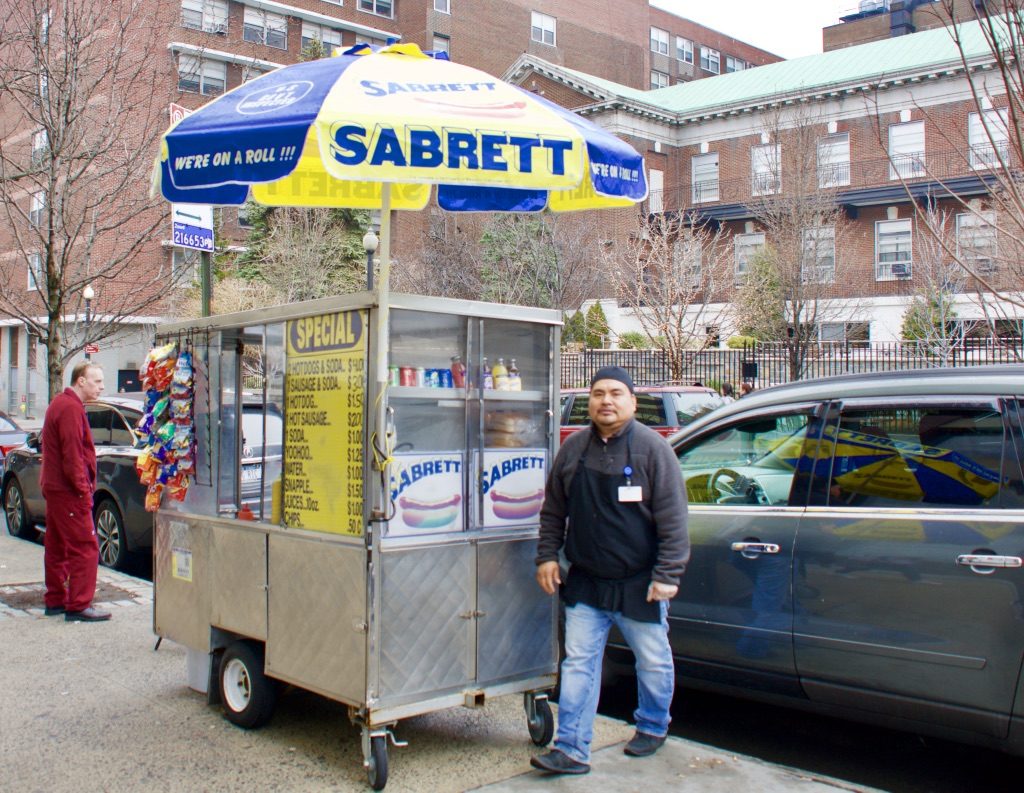
Santiago Sanchez at his hot dog cart, opposite Montefiore Hospital in the Bronx. Photo: Lynn Fantom.
Descendants of the frankfurter, hot dogs were first sold by German immigrants—often with sauerkraut—on push carts on the Bowery in the 1860s, according to food historians.
Today, Santiago Sanchez, 44, sells hot dogs from a shiny stainless steel cart in the Bronx. An immigrant from Puebla, Mexico, he came to the U.S. when he was 17.
Like many food cart vendors in New York City, Sanchez displays the balletic efficiency and upbeat friendliness that attract repeat customers. But he is luckier than many, he thinks, because he is living his own version of the American dream: after a non-stop day, he never eats dinner alone. He met his wife, Roberta, also Mexican, one year after he arrived in the U.S. They married the next year and have raised five children together.
Every morning the food cart, transported from an overnight commissary by Sanchez’s boss, arrives at the corner of Rochambeau and 210th Street in the Norwood section of the Bronx. Out comes the big blue and yellow Sabrett umbrella.
Although there is another Sabrett cart just two blocks away, Sanchez is in a prime location: directly across the street from the main entrance of Montefiore Medical Center. Montefiore is the largest employer in the Bronx, and the Moses Division, the site of Sanchez’s cart, has over 700 beds, attracting a steady stream of visitors.
The vendor at a breakfast cart just a few feet away usually offers Sanchez morning coffee and a bagel. Then, with his food-seller’s permit hanging from his neck, Sanchez begins his 10 a.m. to 5 p.m. shift. Six days a week, he staffs one of the 8,000 mobile food carts and trucks permitted by New York City. In addition to hot dogs, Sanchez sells spicy sausages, cold drinks, cookies, and a wide array of salty snacks.
His greetings change from “boss” to “sir” to “mami” and “papi,” depending upon whether he is addressing a regular customer or someone new. He moves comfortably between Spanish and English, usually in rapid fire. Sometimes, there is just a simple fist-bump for a passerby.
With his six years on this corner, Sanchez has become a familiar face. “I know my customers, and they know me,” he says. When Maria Charles approaches the window, Sanchez has a Sprite ready for the 40-year-old medical secretary.

A Sabrett hot dog with sauerkraut and mustard, although “the works” seems most popular. Photo: Lynn Fantom.
At midday, Sanchez is in constant motion. Lines form and dissipate as he briskly dispenses dogs with various combinations of ketchup, mustard, sauerkraut, and Sabrett’s onions in a tangy tomato sauce. Cabs pull up and drivers jump out with their orders.
Sabrett frankfurters are not grilled, but cooked in a metal vat of warm, salty water. These “dirty water dogs” have a huge New York fan base. So does the onion sauce, which has inspired copycat recipes online, although Amazon sells the real thing in 16-ounce jars.
“We live for the people on the street,” Sanchez says. “They bring us $1 plus $1, and at the end of the day, we make $2. That’s the way it goes.” Shrugging fatalistically, he voices his version of the WWI expression, “Another day, another dollar.” A customer overhears him and says, “Mucho trabajo, poco dinero.”
Sanchez knows the reality of a lot of work for a little money. When he arrived in the U.S., he worked 11-hour days, six days a week, making sandwiches at a deli and later cooking in restaurants.
As the afternoon progresses, “Security” arrives. That is the name Sanchez has given to Yvette Figaro, 45, a dental assistant, who takes a cigarette break at the cart so that Sanchez can use the bathroom. “You can’t trust everyone,” Figaro says proudly.
When there is a lull, Sanchez restocks plastic bags or wipes down his small counter. Sometimes he becomes contemplative. After all, he says, “There are people alone in the hospital. There’s sadness there. Families are upset after a visit.” Then, he makes the sign of the cross. “My kids treat me well. I’ve shown my kids the right way.”
As if on cue, his son, Brian, 13, arrives at the cart. He has finished school (he and his younger brother, Joshua, 7, have earned scholarships to a private Roman Catholic school). After going home to change into work clothes, Brian takes the bus to come and help his father. Self-consciously pointing to a stain on his white hoodie, he says, “As you can see, this job is messy.” While his father packs up supplies in cartons, Brian cleans and polishes the cart, “I make it look shiny,” he says.
His father pays him $30 a week for this assistance, an amount Brian chose. With his black hair and round face, he looks a lot like the elder Sanchez. The sixth-grader says he had been interested in journalism, but now he is thinking about culinary school. Sanchez just smiles and encourages his son to keep studying. He knows that career decisions are a long way off, but that education is key. When all of his children are secure in their jobs, Sanchez’s dream is to return to Puebla with his wife.
But right now, dinner is approaching. He does not know what Roberta, whom he calls a “homewife,” will be making, but she prepares a meal from scratch almost every night. It is usually Mexican, he says—enchiladas, mole poblano chicken, rice with beans and chicken, stews, and soups. And almost always dinner comes with warm tortillas to sop up the sauces.
He seems unconcerned about the menu, saying only, “My wife, she will be waiting for me.”
After the cart is picked up, Sanchez and his son make the short trip home to Morris Heights. Sanchez’s wife of 27 years has prepared mole poblano for the family this Thursday night. They are joined by Joshua, but not his 19-year-old brother, Michael, who is taking college courses. (Their two older siblings, 22 and 25, no longer live at home.) Seated at the kitchen table, they say grace, placing palms together in the old-fashioned style of Roman Catholic prayer. For all to hear, Joshua adds, “Gracias a Dios.”
Tags: Bronx Food


Your Comments